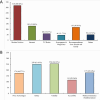Knowledge, attitudes, and practices of outpatients regarding National centralized drug procurement policy: a multicenter cross-sectional study in North China
- PMID: 40595440
- PMCID: PMC12217504
- DOI: 10.1038/s41598-025-98967-0
Knowledge, attitudes, and practices of outpatients regarding National centralized drug procurement policy: a multicenter cross-sectional study in North China
Abstract
The National Centralized Drug Procurement (NCDP) policy has played a crucial role in China's healthcare reform, aiming to enhance drug affordability and accessibility. This study investigated outpatients' knowledge, attitudes, and practices (KAP) regarding the National Centralized Drug Procurement (NCDP) policy in North China. Conducted from September to November 2024, this cross-sectional study utilized online questionnaires in tertiary hospitals to assess KAP scores among 393 participants, comprising 185 (47.07%) males and 231 (58.78%) who visited outpatient clinics 1-2 times per year. A structured questionnaire was designed based on national policies and expert consultation, covering demographic characteristics, knowledge, attitude, and practice dimensions. The survey was conducted using the Wenjuanxing platform, with strict quality control measures to ensure data accuracy and completeness. Statistical analyses, including Spearman's correlation and structural equation modeling (SEM), were performed to explore the associations between KAP variables. The mean scores were 3.51 ± 3.38 for knowledge (range: 0-12), 22.50 ± 4.31 for attitude (range: 7-35), and 32.48 ± 5.01 for practice (range: 11-55). Significant positive correlations were found between knowledge and attitude (r = 0.266, P < 0.001), knowledge and practice (r = 0.551, P < 0.001), and attitude and practice (r = 0.435, P < 0.001). Structural equation modeling revealed that knowledge directly influenced both attitude (β = -0.304, P = 0.006) and practice (β = 0.602, P = 0.009), with an indirect effect on practice through attitude (β = 0.076, P = 0.009). These findings indicate a structured relationship between knowledge, attitudes, and practices, suggesting that interventions targeting knowledge improvement may have cascading benefits on attitudes and behaviors. Overall, outpatients displayed insufficient knowledge, moderate attitudes, and low engagement with the NCDP policy, emphasizing the need for systematic educational campaigns, improved policy communication, and strategies to enhance patient involvement in decision-making regarding centrally procured medicines.
Keywords: Attitudes; Knowledge; National centralized drug procurement; Outpatients; Practices.
© 2025. The Author(s).
Conflict of interest statement
Declarations. Competing interests: The authors declare no competing interests. Ethics approval and consent to participate: All procedures were performed in accordance with the ethical standards laid down in the 1964 Declaration of Helsinki and its later amendments. The study was approved by the Medical Ethics Committee of Taiyuan Central Hospital (2024034-2). All participants were informed about the study protocol and provided written informed consent to participate in the study. All methods were carried out in accordance with relevant guidelines and regulations.
Figures
Similar articles
-
Knowledge, attitudes and practices among rosacea patients in Chongqing, China: a cross-sectional study.BMJ Open. 2025 Apr 10;15(4):e095368. doi: 10.1136/bmjopen-2024-095368. BMJ Open. 2025. PMID: 40216426 Free PMC article.
-
Knowledge, Attitudes, and Practices to Periodontal Health of the Northeast Chinese Public: Cross-Sectional Study.JMIR Public Health Surveill. 2025 Aug 22;11:e72069. doi: 10.2196/72069. JMIR Public Health Surveill. 2025. PMID: 40845832
-
Knowledge, attitude, and practice of Chinese midwives performing in perineal massage for pregnant women in the latter stages of pregnancy.BMC Pregnancy Childbirth. 2025 Mar 31;25(1):376. doi: 10.1186/s12884-025-07495-2. BMC Pregnancy Childbirth. 2025. PMID: 40165141 Free PMC article.
-
Strategies for enhancing the implementation of school-based policies or practices targeting risk factors for chronic disease.Cochrane Database Syst Rev. 2017 Nov 29;11(11):CD011677. doi: 10.1002/14651858.CD011677.pub2. Cochrane Database Syst Rev. 2017. Update in: Cochrane Database Syst Rev. 2022 Aug 29;8:CD011677. doi: 10.1002/14651858.CD011677.pub3. PMID: 29185627 Free PMC article. Updated.
-
Interventions for preventing and reducing the use of physical restraints for older people in all long-term care settings.Cochrane Database Syst Rev. 2023 Jul 28;7(7):CD007546. doi: 10.1002/14651858.CD007546.pub3. Cochrane Database Syst Rev. 2023. PMID: 37500094 Free PMC article.
References
-
- Lan, T., Guan, L., Pang, X., Li, X. & Yu, Q. Impact of the National centralized drug procurement policy (4 + 7 policy) on the drug expenditures of patients treated in outpatient and emergency departments in a large tertiary level-A hospital in China: A single centre, interrupted time series. J. Clin. Pharm. Ther.47 (1), 104–111 (2022). - PubMed
-
- Yang, C. et al. The impacts of the National centralized drug procurement policy on the use of policy-related antibiotic agents: the case of Shaanxi Province, China. Expert Rev. anti-infective Therapy. 21 (6), 675–684 (2023). - PubMed
Publication types
MeSH terms
LinkOut - more resources
Full Text Sources



